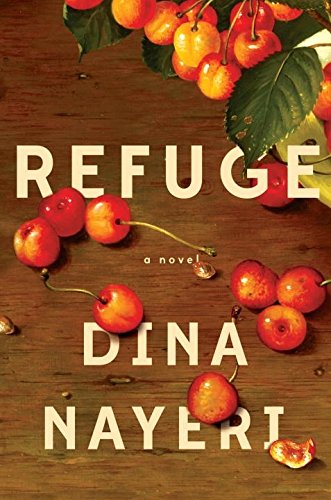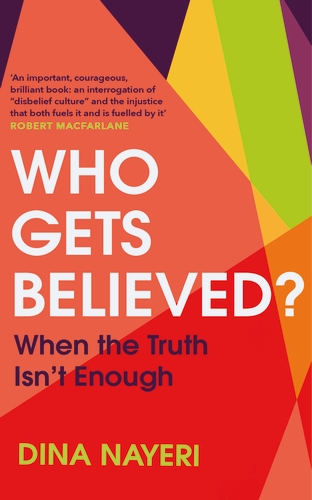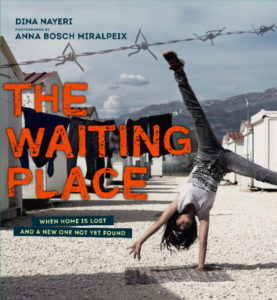It is always good to look at individual stories, and to listen to the details… That is always the answer for creating empathy. I think that storytelling is the most powerful form of persuasion there is.’
Dina Nayeri speaking on the Visualising War and Peace podcast
Dina Nayeri, is an author and lecturer in creative writing at the University of St Andrews. She spent her early years in Isfahan in Iran, before fleeing with her mother and brother after her mother was arrested for converting to Christianity. They ended up settling in the US, and Dina read Economics at Princeton, before embarking on a career as writer, publishing award-winning fiction and non-fiction. Dina shared her story with us in this podcast interview, where she also discusses the different approaches she has taking to writing about forced migration.
‘When we became refugees, it became very clear that we had fallen in society. There was a feeling that no one cared what we could do anyone, how educated we were… because not only were we poor, but we were this outcast, displaced, wretched class of society. The way that my mother was talked to and listened to changed, the way that I was treated changed…’
Dina Nayeri speaking on the Visualising War and Peace podcast


Much of Dina’s writing draws on her experiences as a refugee and reflects on many different aspects of displacement. Her first novel, A Teaspoon of Earth and Sea, tells the story of an Iranian girl and her family who experience separation and political oppression in post-Revolutionary Iran, and it conjures a rich imaginative space for exploring what it can be like not to flee, but always to dream of an alternative life in a different country and culture. Her second novel Refuge also revolves around the story of a young Iranian girl, who escapes to America as a child but leaves her father behind; and Dina takes the opportunity here to explore concepts of home and belonging as well as movement and separation, as experienced across many years.
‘I think a lot of times when we first arrive as immigrants and refugees, we feel like we have to show our best self, our perfect self, all the time: the mask of a smile in front of the native-born. And the native-born feel like they’re owed that, because they have made space. But the fact is that they haven’t done anything, and what the country has done in accepting these refugees and immigrants is a humanitarian duty.’
Dina Nayeri speaking on the Visualising War and Peace podcast

Turning to non-fiction, Dina’s multi-award-winning book The Ungrateful Refugee: What Immigrants Never Tell You weaves her own story together with a host of other real-life refugee stories, and asks important questions about the demands that people and governments make of refugees, while shining new light on what refugees themselves experience. Dina scrutinises attitudes to refugees and asylum-seekers further in her latest book, Who Gets Believed?, which explores practices of truth-telling alongside cultures of disbelief, and underlines what inequalities persist and are enacted when we are selective (and prejudiced) about who we believe.
‘When I was in the refugee camp, there was this feeling of waiting waiting waiting, forever, like it would never end. One of the most wonderful quotes a refugee told me was that waiting in a refugee detention camp is so much worse than waiting in prison, because in prison you count down the days, but in a camp you count up the days. There is no knowing when it will end.’
Dina Nayeri speaking on the Visualising War and Peace podcast

Dina has also collaborated with photographer Anna Bosch Miralpeix to write The Waiting Place, a book which documents the struggles and dreams of ten young refugees from Iran and Afghanistan in a refugee camp in Greece. Inspired by her own understanding of what waiting in a refugee camp can be like, and also by her childhood experiences of racism and bullying in the school setting as a newly-arrived refugee, Dina uses this book as a basis for schools workshops across Scotland and beyond, teaching the importance of empathy and compassion.
‘Remembering how hard it was for me to arrive, and how rare and hard won the welcome was… I wanted to show children in the UK: here is what they have been through, these kids, before they reach you… They more than anyone could use a friend.’
Dina Nayeri speaking on the Visualising War and Peace podcast
In discussing each of Dina’s books, the podcast touches on a range of important issues, from what refugees experience, over many decades, to what host communities often expect or demand of them. We also reflect on role that storytelling habits can play in shaping how we receive and respond to stories of forced migration, and Dina reminds us how culturally diverse those habits can be – and how important is it to be open to other people’s storytelling traditions.
‘The main point of the book Who Gets Believed is that credibility depends very much on our own deeply embedded shortcuts, that come from the kind of stories we heard as children, the kinds of ways that credibility was manifested and displayed, and its very cultural and very narrow. And this is why immigrants are so widely disbelieved, because their performance of credibility is so different from what we’re used to in the West…’
Dina Nayeri speaking on the Visualising War and Peace podcast